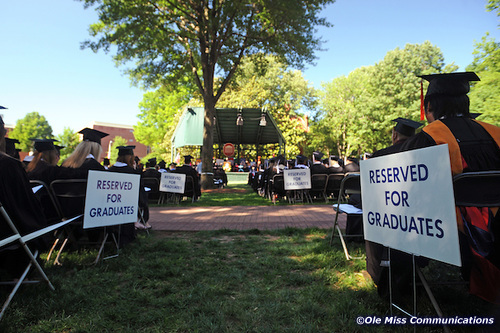MA students to graduate May 12

Written By Grace Nelson
With graduation quickly approaching, the students who are attaining their master’s degrees in Southern Studies are busy mapping out their futures. Here’s a quick look at what’s in store for our soon-to-be graduates.
Jacqueline Sahagian: After graduation, Jacqui will to move back her hometown of Nashville, in hopes of landing a job in a museum or other cultural institution. She plans to begin applying to doctoral programs for the fall of 2018, so that she may continue her research on the intersection of gender, race, and place in Southern music. Jacqui completed her MA thesis exploring the problematic marketing techniques deployed by the Oxford, Mississippi-based record label Fat Possum.
“I loved my time here at the Center and am obsessed with every aspect of Southern Studies.”
Holly Robinson: Holly has made plans to return to her home country of England, where she hopes to eventually make her way to London and start her ideal job working at the American embassy. While she remains open to job opportunities, Holly has started looking at jobs in the public relations and marketing fields, so that she may utilize what she learned while writing her thesis. Holly’s MA thesis focused on Aunt Jemima, and argues that the various owners of Aunt Jemima have commodified the African American body for their own commercial gain.
“I would just like to thank the Center for the Study of Southern Culture and the British Association of American Studies for allowing me to study at Ole Miss, and to everyone here for their support. I will miss them all greatly.”
Kevin Mitchell: Immediately following graduation, Kevin plans to return to Charleston, South Carolina and assume his teaching position at the Culinary Institute of Charleston, where he currently holds a chef instructor position. While at working on his MA at UM, Kevin has continued to teach online classes at CIC. As a chef, Kevin’s thesis focused on foodways – discussing both enslaved and freed cooks from Charleston in the 1800s. His thesis also discusses the influence of Southern cuisine based on the ingredients in which the enslaved brought with them and grew here that have become part of the Southern cuisine cannon.
“My time here has been fantastic. It has been a wonderful journey that was surrounded by colleagues who are doing great work in the field of Southern Studies and it was an honor to be among them and learn from them.”
Tori De Leone: Tori plans to attend Wake Forest to earn an MFA in Documentary Arts. The three-year long program offers coursework in arts business, pedagogy, and distribution. Tori believes that the program will allow her to delve deeper into her interest in film and turn it into a career one day. Tori created “Small Batch,” a documentary thesis centered on the role of women in the craft beer and whiskey industries. The short film focuses on a female brewer and distiller at different Southern craft companies, and seeks to balance their experiences as women in the industry with their passion for their careers.
“The Center has been so outrageously supportive of my development as a filmmaker and a scholar. Through the documentary track and the help of Ava Lowrey and Andy Harper in particular, I’ve been able to explore my interests, creativity, and critical thinking simultaneously, in a way that I don’t believe any other program allows.”
Rachel Childs: Rachel plans to move to New Mexico, where she has accepted a job working as a content specialist for PR Newswire. Meanwhile, she will continue looking for editorial and producer jobs in public media/public history/oral history/university presses for her long-term career path. While working on her MA, Rachel completed a thesis on the Mississippi State Lunatic Asylum and how it served as a case study for southern psychiatry, constructions of deviance, and Mississippi’s upholding of Jim Crow through eugenics. In addition to her written thesis, Rachel also produced a radio documentary that situated these questions around the evidence of 7,000 bodies recently discovered buried on the University of Mississippi Medical Center campus (the site of the old asylum), and their plans to exhume them.
“At 28, leaving a full-time job with benefits to move across the country and go back to school, debt, and stipend-life seemed (and still seems) crazy. But the support I received here from advisors, professors, friends, and colleagues can’t be overstated. I learned so much in a short amount of time, and met the coolest people doing the most worthwhile, necessary things with vigor, care, and passion.”
